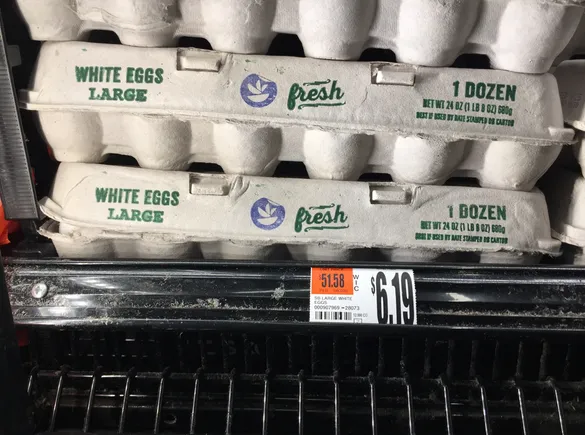Emma Ignaszewski is the director of corporate engagement at the Good Food Institute. Opinion’s are the author’s own.
Easter is synonymous with egg hunts. Growing up, my sister and I would eagerly participate in egg hunts in our backyard in Phoenix. Even as teenagers, we kept up the tradition, competing to see who could find the most eggs.
This year, families across the country may encounter a hurdle with their annual egg hunts in April due to the ongoing Avian flu outbreak. After three years, the availability of eggs has become uncertain and costly. Unfortunately, this situation is unlikely to improve in the near future, with fluctuating prices and limited supply becoming the new norm.
Food companies need to start preparing for the recurring threat of Avian flu and acknowledge that egg price instability is not an isolated incident but a consistent pattern. Past Avian flu outbreaks in 2014-2015, 2022-2023, and various regions globally have resulted in over 160 million bird deaths or culls to contain the virus, causing egg prices to nearly triple. The prolonged spikes in prices and disruptions in the supply chain highlight the vulnerability of our food system, leaving both consumers and businesses exposed to unpredictable costs.
Americans rely on eggs for a multitude of purposes, and many food companies incorporate eggs into their products. Eggs are valued for being a convenient source of protein. As an expert in the industry who studies consumer behavior and trends, I can attest that the demand for eggs remains high. However, the traditional stability of American egg consumption is now at risk, presenting an opportunity for food companies to explore alternative options.
One potential solution is to shift away from relying solely on eggs. Plant-based egg sales in U.S. grocery stores currently represent less than 0.5% of total egg sales, indicating a significant growth potential. Around 30% of U.S.-produced eggs are used in commercially baked goods and pastas, offering food manufacturers a unique chance to explore alternatives that can deliver the same functionality as eggs without compromising the consumer experience.
Plant-based egg ingredients are increasingly available and diverse, offering versatile applications, catering to consumer interest in allergen- and animal-free products, and in some cases, cost advantages. Various egg replacement options made from chickpea flour, soy, mung bean protein, canola protein, aquafaba, tapioca flour, and even duckweed are already in the market. These alternatives provide affordability, convenience, and stability, with some estimates suggesting a cost reduction of up to 30% by switching to plant-based options.
Furthermore, new ingredient solutions such as precision fermentation are emerging. This innovative process produces ingredients that mimic animal proteins without the need for animals, reducing the risk of zoonotic diseases like Avian flu. Companies are exploring precision-fermented dairy and egg alternatives, with products like dairy-free mozzarella and plant-based omelettes already making their way onto restaurant menus.
A recent report from McKinsey highlights the supply chain benefits of fermentation-enabled proteins, projecting a potential market size of $150 billion by 2050. These products offer geographic flexibility, reducing exposure to weather, supply chain, and disease-related disruptions in the traditional food and agriculture chain. Consumers can expect a reliable supply of plant-based alternatives without being affected by conventional egg price fluctuations or shortages.
While reformulation to incorporate egg alternatives involves challenges such as ingredient selection, technical feasibility assessments, supply chain adjustments, and production scale-up, these obstacles are manageable. Several large food companies are already investing in egg replacements to safeguard their supply chains against disruptions and price fluctuations. Leading U.S. food ingredient suppliers have introduced egg-replacement ingredients, while industry giants like Unilever, Nestle, and Bel Brands are incorporating precision fermentation-derived ingredients into their products.
Plant-based and precision fermentation-derived ingredients serve as a strategic hedge against supply chain disruptions, ensuring business continuity, cost stability, and sustainability. By embracing these alternatives, companies can better prepare for future disruptions and provide affordable options for both themselves and consumers. These alternatives can also help meet surges in demand during holidays like Easter and Passover.
Companies that proactively reconsider their egg ingredient strategies today will be better equipped to navigate future disruptions in the food industry.

